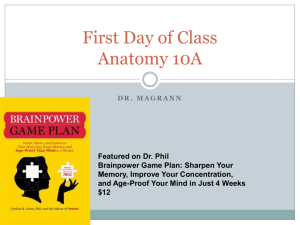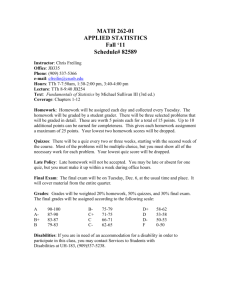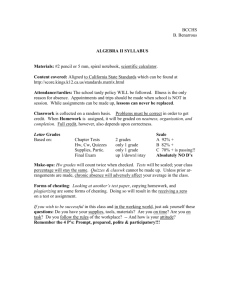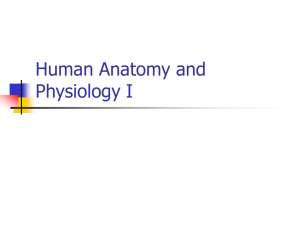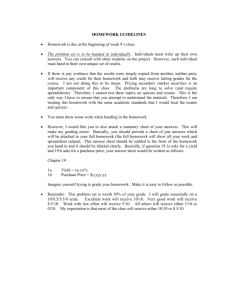first day of class ppt
advertisement
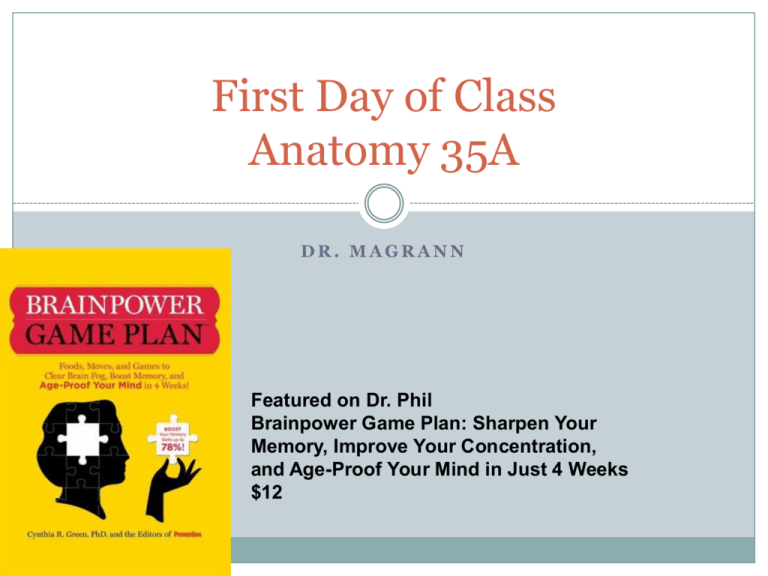
First Day of Class Anatomy 35A DR. MAGRANN Featured on Dr. Phil Brainpower Game Plan: Sharpen Your Memory, Improve Your Concentration, and Age-Proof Your Mind in Just 4 Weeks $12 Avoid risky activities during this semester! Petitioners Due to State Budget cutbacks, we can take only 36 students. I am required to take those on the waitlist first, in order. Then I can take petitioners according to their registration date. You must show proof of your date. However, no waitlist students or petitioners will be added until the end of the second week of school. You will be dropped from consideration if you do not abide by the following rules: Petitioners Petitioners and waitlist students will be dropped from consideration if they do not abide by all of the following rules: 1) Attendance at all lecture and lab for week 1 and 2 2) Must pass (with a C) the first lab quiz (given on week 2) 3) Must pass (with a C) the first lecture quiz Instructor: Tracey Magrann, DPM, PhD E-Mail: TraceyMagrann@gmail.com “Office” hours (by way of email): Mon-Fri 9 am – 11 pm; I also check email eves and weekends Web Site: www.drmagrann.com Textbooks and Other Supplies (Recommended; other books or older versions okay) Lecture: Human Anatomy, by Martini, Timmons and Tallitsch. Benjamin-Cummings Publishers Lab: Anatomy 35 Human Anatomy Laboratory Manual. Presch, M. V. Pascoe, C. Rexach, A. Anderson. 2011. 1st ed. Hayden-McNeill Publishers Lab coat, Dissection kit, goggles, gloves, long pants, closed toed shoes (Shoes that completely cover your foot) Scantrons: (4) #882-E and (9) quiz strips #815-E (15 questions) MAKE SURE YOU DON’T FOLD OR WRINKLE THEM Grading Policy Lecture Grades are based on lecture exams and quizzes A = 90-100% B = 80-89% C = 70-79% D = 60-69% F<60%. Lecture Exams and Quizzes There are a total of 9 quizzes during the semester. The material on the quizzes is on the lecture material from the previous week (all quizzes are multiple choice except the first one is short answer). Each quiz is 10 questions, worth 1 point each. Use a quiz strip for the quizzes. Your lowest 3 quizzes will be dropped to allow for sick days and missed quizzes. You cannot make up a lecture missed quiz. All four lecture exams are 70 questions worth 2 points each. They are multiple choice (use a scantron) and have some fill in the blanks at the end. They have a few questions from the previous units. The points in lecture total 620. There is no extra credit in lecture or lab. Total points in lab is 540 (4 lab exams,) Total points for the course are 1160. Lecture and Lab Make-up Exams It is essential that you be present for scheduled exams. Makeup lecture exams will be administered for severe and compelling reasons only, and only when notice is given directly to the Instructor well in advance of the exam or when accompanied by a physician’s note. You cannot make up a lab exam for any reason, since it takes a team of instructors hours to set it up. Cell Phones Please turn your cell phone to vibrate during class time. Please turn your cell phone OFF during exams. You are NOT ALLOWED TO ANSWER A CELL PHONE DURING AN EXAM OR QUIZ. Please arrange in advance for another person to be an emergency contact for your children during your exam times. You also must have all cell phones put away (out of your sight and out of reach) during all quizzes and exams. Disabilities If you have specific disabilities and require accommodations, please let me know in the first week of the semester so that your learning needs may be appropriately met. You will need to provide documentation of your disability to the DSPS Office. All discussions will remain confidential. Getting a W or an F? If a student gets a D or F in a class, you can retake the class, but the bad grade will always remain on your transcript along with the new grade. Since the bad grade also appears on your record, you may want to consider dropping the class instead of getting the bad grade that future schools can still see. Getting a W is also not viewed favorably by your future school. The last day to drop a class without a W is on the day after our first lecture exam. Getting a B or a C? If you get a B or C in a class, you cannot take it again at the same school DISTRICT. You can take it again elsewhere, but both of your grades will be seen by the allied health school if you submit both transcripts. The allied health schools look at a C the first time you take a class and an A the second time you take a class, and they often will calculate it as the average of both grades. Tip If you plan on withdrawing with a W and retaking the class, it is better to stay here until the last day to drop with a W (about 6 weeks before the end of the semester). Once you drop, you cannot come back in to the classroom to audit…problems with liability. How do nursing schools feel about W’s and F’s? Cypress –One W in the prerequisites is OK. Cerritos –Only allows 1 W, D, or F for prerequisites. Can repeat 1 prerequisite to improve the grade. Golden West –They have a formula for the number of W, D, or Fs on the transcripts. Long Beach City College –Only allows 1 W, D, or F for prerequisites. Can repeat 1 prerequisite to improve the grade. Santa Ana – Student can petition to have the W, D, or F removed. GPA will calculate both grades until substandard grade removed. The number of W, D, or Fs does not affect entry. The first passing grade is the grade used to calculate points for entry into the program. Other Allied Health Schools National University –The number of W, D, or Fs does not affect entry. The first passing grade is the grade used to calculate points for entry into the program. California Baptist University –They have a formula for the number of W, D, or Fs on the transcripts. Everest College –Only allows 1 W, D, or F for prerequisites. Can repeat 1 prerequisite to improve the grade. Kaiser Allied Health Training –Only allows 1 W, D, or F for prerequisites. Can repeat 1 prerequisite to improve the grade. Concord Career College– One W in the prerequisites is OK. New Rule! All Community Colleges must abide by a new State rule: No one can take the same class more that three times in one school District (our District is just Mt. SAC). If you have taken this class twice in this school, this is the last semester you can take it again. If you drop or flunk again, you would need to go to another school district. New State Rule: Three Strikes A withdrawal is now counted the same as a D or F for this new State rule. They give you 3 strikes. If you get an F, that is one strike. If you get a W, that is one strike If you get a D, that is one strike. If you get three strikes in the same course (even with different instructors), you cannot take the class again in the same school district. If you had extenuating circumstances, you may petition to have a strike removed. Grades vs. Hours per Week Studied A B C D F 0 5 10 15 20 25 Hours per week studied 10 hours C 15 hours B 20 hours A 30 35 Grades Posted by Random ID Number It is against campus policy to post grades by student names or ID number. Therefore, you will be assigned a random number to use this semester so you can see your grades each month on my website, including your class rank. Sickness Safety If you have a fever, please do not come to class until the fever has been gone for 24 hours. Class Announcements by Email Once you are enrolled, send me an email from your preferred email address so I can send you notices about when grades are posted, announcements, or when I make changes to the website. Then I will have your email address that you wish for me to use. I will send the class emails as a blind carbon copy so no one sees your email address. Letters of Recommendation Look ahead at the letters of recommendation you will be needing! They ask me about how prompt you are, your written communication skills, and some ask for your class rank. Pharm Cas Sample Letter of Recommendation FOR PTCAS: How would you rate the applicant for each of the following characteristics? • Commitment to Learning: The ability to self-assess, self-correct and self direct; identify needs and sources of learning; continually seek new knowledge and understanding. • Interpersonal Skills: The ability to interact effectively with patients, families, colleagues, other healthcare professionals and the community; deal effectively with cultural or ethnic diversity issues. • Communication Skills: The ability to communicate effectively (speaking, body language, reading writing, listening) for varied audiences and purposes. • Effective Use of Time: The ability to obtain the maximum benefit from a minimum investment of time and resources. • Use of Constructive Feedback: The ability to identify sources of and seek out feedback; to effectively use and provide feedback for improving personal interaction. FOR PTCAS: How would you rate the applicant for each of the following characteristics? • Ethical and Professional Behavior: The ability to exhibit appropriate ethical and professional conduct and to represent the profession effectively. • Responsibility: The ability to fulfill commitments, be accountable for actions and outcomes, and to persevere to achieve goals. • Critical Thinking: The ability to question logically; identify, generate and evaluate elements of logical argument; recognize and differentiate facts, illusions, assumptions; distinguish the relevant from the irrelevant. • Stress Management: The ability to identify sources of stress, develop effective coping behaviors, and adapt well to change. • Problem Solving: The ability to recognize and define problems, use imagination and creativity to solve problems, analyze data, develop and implement solutions, and evaluate outcomes. • Leadership: The ability to take initiative and motivate or guide others; generates ideas and plans or shares a vision for the future. Physical Therapy Letter of Recommendation Characteristics • • • • • • • • • • • • • * How would you rate the applicant for each of the following characteristics? Please select the rating that best describes the applicant in the category. (5) Excellent (4) Good (3) Average (2) Below Average (1) Poor (N/O) Not Observed. Select 'Not Observed' (N/O) if you have not had an opportunity to evaluate the characteristic or have no basis for assessment. Commitment to Learning: The ability to self-assess, self-correct and self direct; identify needs and sources of learning; continually seek new knowledge and understanding. Interpersonal Skills: The ability to interact effectively with patients, families, colleagues, other healthcare professionals and the community; deal effectively with cultural or ethnic diversity issues Communication Skills: The ability to communicate effectively (speaking, body language, reading writing, listening) for varied audiences and purposes. Effective Use of Time: The ability to obtain the maximum benefit from a minimum investment of time and resources. Use of Constructive Feedback: The ability to identify sources of and seek out feedback; to effectively use and provide feedback for improving personal interaction Ethical and Professional Behavior: The ability to exhibit appropriate ethical and professional conduct and to represent the profession effectively Physical Therapy Letter of Recommendation Characteristics • • • • • • • • • • Responsibility: The ability to fulfill commitments, be accountable for actions and outcomes, and to persevere to achieve goals Critical Thinking: The ability to question logically; identify, generate and evaluate elements of logical argument; recognize and differentiate facts, illusions, assumptions; distinguish the relevant from the irrelevant Stress Management: The ability to identify sources of stress, develop effective coping behaviors, and adapt well to change Problem Solving: The ability to recognize and define problems, use imagination and creativity to solve problems, analyze data, develop and implement solutions, and evaluate outcomes Leadership: The ability to take initiative and motivate or guide others; generates ideas and plans or shares a vision for the future CASPA Recommend Form OptomCas (Optometry School) • • • • • • • • • • • • • • • • How would you rate the applicant for each of the following characteristics? Please select the rating that best describes the applicant in each category. Leadership - The ability to take initiative and motivate or guide others; generates ideas and plans or shares a vision for the future. Intellectual Ability to Undertake a Rigorous Academic Program - The ability to synthesize new information and locate necessary learning resources; is intellectually curious. Interpersonal Skills - The ability to interact effectively with patients, families, colleagues, other healthcare professionals and the community; deal effectively with cultural or ethnic diversity issues. Oral Communication Skills - The ability to communicate and effectively express thought verbally for varied audiences and purposes. Written Communication Skills - The ability to communicate and effectively express thought in writing for varied audiences and purposes. Team Skills/Collaboration - The ability to work effectively with others and develop positive relationships. Organizational Skills - The ability to prioritize workload, meet deadlines and manage tasks with a high level of responsibility and dependability. Time Management - The ability to obtain the maximum benefit from a minimum investment of time and resources. Stress Management - The ability to identify sources of stress, develop effective coping behaviors, and adapt well to change. Receptiveness to Feedback - The ability to identify sources of and seek out feedback; to effectively use and provide feedback for improving personal interaction. Self-Awareness - The ability to self-assess, self-correct and self-direct Integrity - The ability to exhibit appropriate ethical and professional conduct and to represent the profession effectively. Knowledge Of Profession - The ability to explain Why Optometry and effectively communicate why this is his/her desired profession. Promise of Achievement as a Primary Healthcare Provider - The ability to be committed to excellence in patient care; be a steward for the profession of optometry with utmost integrity and honor;remain knowledgeable of advancements in vision science Clinical Care Extender Program This is one of the many places where you can get volunteer experience working with patients. Many schools require 1000 hours of patient contact before you are considered for admission to the program. See my website for more volunteer opportunities. A little about myself…. Microbiology major, CSULB Graduated from Samuel Merritt College of Medicine, 1986. Spent my 4th year at USC Medical Center Surgical Residency in several OC Hospitals Private practice in Orange County as physician and surgeon for 20 years. Came down with leukemia, had to close my doors. Recovered, decided to go into teaching. A little about myself…. Updated my microbiology classes at CSULB. Earned a Community College Teaching Certificate at CSUDH, completed my internship in Anatomy at Fullerton College. I then graduated from Loma Linda University with a PhD in Biology. I have mainly been teaching Anatomy, Microbiology, and Physiology for the past 10 years at 12 schools in all nearby Counties. A little about myself…. I did two research projects at LLU: 1. Algal control by phosphate restriction in freshwater lakes. Involves using a modified Koi pond sand bed filtration system to filter lakes, with the use of ferric chloride to bind up the phosphate in the water. Without the phosphate, the algae cannot grow. 2. The prevalence of blue-green algae toxins that cause liver cancer. What coastal lagoons are harboring the algae that produce these toxins? Why are some lagoons affected and others are not? Which lagoons are harbors for endangered species?
